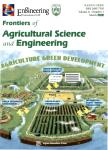Changes in bulk soil affect the disease-suppressive rhizosphere microbiome against Fusarium wilt disease
Changes in bulk soil affect the disease-suppressive rhizosphere microbiome against Fusarium wilt disease作者机构:Jiangsu Provincial Key Laboratory of Solid Organic Waste UilizationJiangsu Collaborative Innovation Center of Solid Organic WastesEducation Ministry Engineering Center of Resource Saving FertilizersNanjing Agricultural UniversityNanjing 210095China School of Life SciencesLiaoning UniversityShenyang 110036China Ecology and Biodiversity GroupDepartment of BiologyInstitute of Environmental BiologyUtrecht UniversityUtrecht3584 CHThe Netherlands Department of Plant ScienceThe Pennsylvania State UniversityUniversity ParkPA 16802USA Huck Institutes of the Life SciencesThe Pennsylvania State UniversityUniversity ParkPA 16802USA Hainan Key Laboratory for Sustainable Uilization of Tropical Bio-ResourcesInstitute of Tropical Agriculture and ForestryHainan UniversityHaikou 570228China
出 版 物:《Frontiers of Agricultural Science and Engineering》 (农业科学与工程前沿(英文版))
年 卷 期:2020年第7卷第3期
页 面:307-316页
学科分类:0710[理学-生物学] 0831[工学-生物医学工程(可授工学、理学、医学学位)] 0905[农学-畜牧学] 09[农学] 0906[农学-兽医学] 0904[农学-植物保护] 090401[农学-植物病理学] 0836[工学-生物工程]
基 金:This research was funded by the National Key Research and Development Program(2017YFD0202101) the National Natural Science Foundation of China(31672239 and 31972509) the 111 project(B12009),the Priority Academic Program Development of the Jiangsu Higher Education Institutions(PAPD) the Innovative Research Team Development Plan of the Ministry of Education of China(IRT17R56).
主 题:agricultural practice bulk soil disease suppression rhizosphere ecology
摘 要:Harnessing disease suppressive microbiomes constitutes a promising strategy for optimizing plant growth.However,relatively lttle information is available about the relationship between bulk and rhizosphere soil microbiomes.Here,the assembly of banana bulk soil and rhizosphere microbiomes was investigated in a mono-culture system consisting of bio-organic(BIO)and organic management practices.Applying BIO practice in newly reclaimed fields resulted in a high-efficiency biocontrol rate,thus providing a promising strategy for pre-control of Fusarium wilt disease.The soil microbiota was further characterized by MiSeq sequencing and quantitative PCR.The results indicate that disease suppression was mediated by the structure of a suppressive rhizosphere microbiome with respect to distinct community composition,diversity and abundance.Overall microbiome suppressiveness was primarily related to a particular set of enriched bacterial taxa affiliated with Pseudomonas,Terrimonas,Cupriavi-dus,Gp6,Ohtaekwangia and Duganella.Finally,struc-tural equation modeling was used to show that the changes in bulk soil bacterial community determined its induced rhizosphere bacterial community,which serves as an important and direct factor in restraining the pathogen.Collectively,this study provides an integrative approach to disentangle the biological basis of disease-suppressive microbiomes in the context of agricultural practice and soil management.



